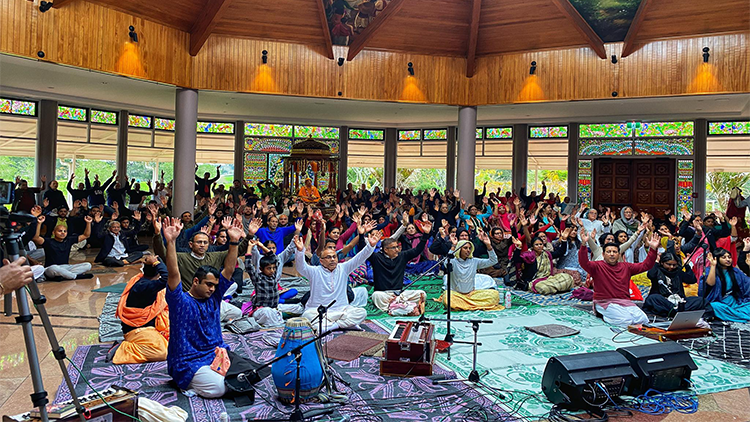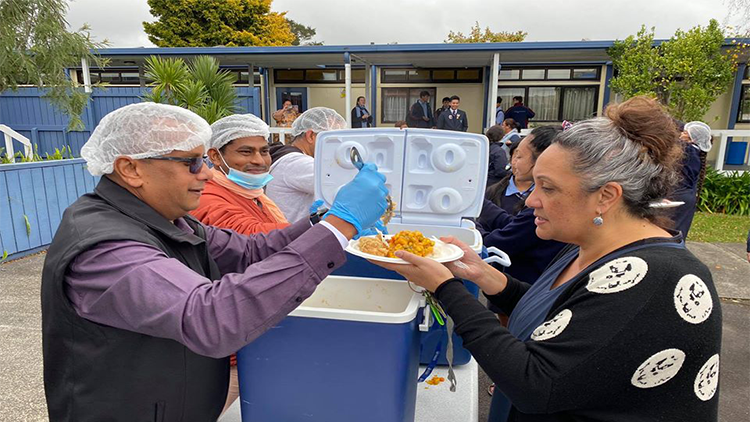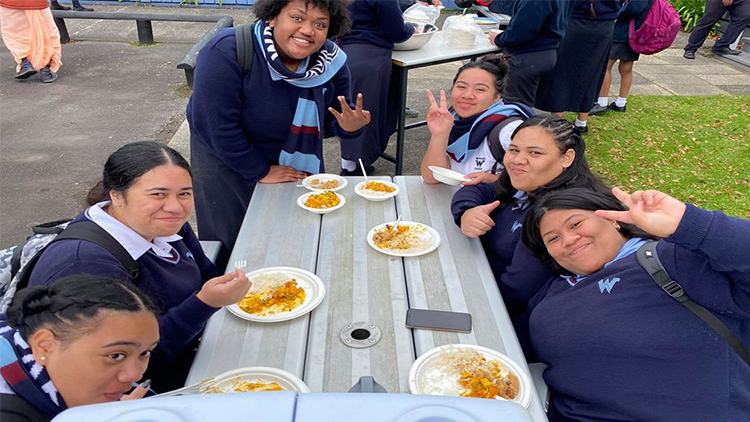ISKCON New Zealand Returns to Normal As Country Lifts All Restrictions
By Madhava Smullen | Июл 04, 2020

ISKCON temples in New Zealand have returned to their normal activities, with devotees going back to regular life after the government lifted all COVID-19 restrictions except for border control measures on June 8th.
New Zealand has been widely praised for its aggressive response to COVID-19, aiming for an elimination strategy early on that many thought would not work. On March 25th, when the country only had 205 COVID-19 cases and no deaths, the government announced Alert Level 4 and implemented one of the strictest lockdowns in the world.
At New Varshana, a 100-acre property in the suburbs of Auckland, the gate was bolted, and devotees could only leave for essential reasons like buying food and going to the doctor. Only pujaris were allowed into the temple, and followed strict hygiene procedures. There were no programs or kirtans. Fortunately, the temple was able to get by on savings.
On April 27th, New Zealand moved down to Alert Level 3, and devotees were able to have kirtan on Sundays with ten people, while still keeping a distance of two meters (six feet).
On May 13th, Alert Level 2 came into play, with gatherings of up to 100 people allowed.
Since May 22nd, New Zealand has recorded no new locally acquired cases. The 22 current active cases are citizens in supervised quarantine after returning from overseas.

Devotees distribute prasadam at a local college in the Auckland area
Since June 8th, the government has declared the disease “contained,” and “everyone can return without restriction to work, school, sports and domestic travel.” According to New Zealand’s Ministry of Health, “All public and private events and gatherings, sports and cultural activities can now go ahead… indoors or outdoors, without limits on numbers or any physical distancing requirements.” Strict border control remains and international travel is not allowed, except for returning New Zealand citizens who must go into quarantine for 14 days.
On Sunday June 21st, after two and-a-half months in one stage or another of lockdown, devotees at New Varshana held their first major program for Bhaktivinode Thakur’s disappearance day.
The festival drew 300 to 400 people. “We expected 500, but the fear factor is still there [due to the international quarantined cases],” says temple president Kalasamvara Das. “People are still a little fearful of coming together in groups.”
During the festival different congregational families each picked a song by Bhaktivinode Thakur to sing, and read the translation for. The event also included a Nrsimha yajna for Bhakti Charu Swami, who is in critical condition due to COVID-19, a pushpanjali offering, and a feast.
Meanwhile, Auckland devotees are back to holding their regular Friday night Harinamas on the streets, and doing book distribution.
On June 24th, they also did their first prasadam distribution at a local college, feeding about 1,400 students.
“Now schools are ringing us up and inviting us to come and continue our Food for Life school program,” says Kalasamvara.

College students enjoy prasadam
The New Varshana president is obviously relishing the chance to serve, and do what he loves again after months of lockdown but he says “I’m also a little reserved” because of “how much suffering there is going on out there in this planet of ours.”
When asked why New Zealand was successful in containing COVID-19 and what we can learn from it, Kalasamvara recalls how Prime Minister Jacinda Ardern of New Zealand dealt with the issue.
“Even after running the campaign to keep Kiwis safe, every night before she took rest, she’d go online and talk to millions of people,” he says. “Just talk to them personally – ‘What are your concerns, how are you functioning, how are things going on?’ It seems like that personal aspect touched the hearts of so many people. And because of her mood, then people jumped on board [with precautions and staying at home]. I’ve never experienced that at all with any politician.”
Conspiracy theories about COVID-19 continue to abound, Kalasamvara says, “But the fact is, people are dying, people are suffering, people are going through hardships.” Paraphrasing, he recalls that Srila Prabhupada taught devotees to “be gentlemen and follow the law of the land,” and adds, “So whatever country you’re in, I would follow the law of the land. If they’re saying stay home, stay home. If they’re saying wear masks, wear masks. I followed everything the government wanted me to do… The main thing is, the devotees need to stay safe. There’s not so many of us, and we have to be really conscientious.”
While the rest of the world expects to be dealing with Coronavirus for the long haul, even New Zealanders are facing their own anxiety, according to a July 1st Guardian article: “an open-ended uncertainty about their own futures and New Zealand’s place in the world if the virus continues to rage elsewhere.”
“Who knows what’s going to happen tomorrow,” Kalasamvara says. “All of a sudden, little New Zealand could become the worst place in the world. So let’s just say the sun shines out at the moment, and we’re hoping it stays out.”















